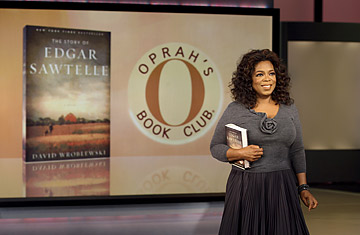
Oprah Winfrey holds a copy of her latest book club pick during taping for her live show Friday, Sept. 19, 2008, in Chicago.
It's the greatest force in publishing today, with the power to raise authors from the dead (Leo Tolstoy) or crucify them on the national stage (James Frey). The all-powerful Oprah Book Club is not so much a club as a ruthlessly influential marketing vehicle, with the power to fundamentally alter best-seller lists, Amazon rankings and royalty payments. Sure, the "club" has 2 million "members" and a web site that provides a space for users to share thoughts on featured titles, read excerpts and get advice like, "How to Read a Hard Book." But in the 12 years Oprah's Book Club has existed, its significance has been — from the perspective of authors and editors, at least — not its sense of community, but its influence on sales, which has been known to increase a print run fivefold.
So by the time Oprah Winfrey announced publicly on Sept. 19 that her club's newest title would be The Story of Edgar Sawtelle, a book about a mute boy and his dogs by a first-time novelist — albeit a critical darling — its publisher had already ordered 750,000 "Oprah versions" from the printers. Boxes of these freshly minted tomes, with the Oprah's Book Club seal affixed to the covers — and a unique ISBN number to ensure accurate tracking of sales — were already on their way to bookstores across the country. The Story of Edgar Sawtelle, by software designer David Wroblewski, debuted at #14 on the New York Times fiction bestseller list with an initial print run of 26,000 and crept up to #2; it will be #1 on the list published October 5.
"The best novel I've read in a long, long, long, long time...a literary feast of a book," Winfrey gushed on her show, saying it deserved to enter the cannon alongside works by John Steinbeck and Harper Lee.
"Having an Oprah Book Club selection is pretty much like the pinnacle for the industry," says Michael McKenzie, publicity director for Ecco, the small HarperCollins imprint that published The Story of Edgar Sawtelle.
Not everyone agrees. After Winfrey picked Jonathan Franzen's The Corrections in 2001, the author said he had never seen her show and the thought of his book having "that logo of corporate ownership on it" dismayed him. "[S]he's picked enough schmaltzy, one-dimensional ones that I cringe," said Franzen at the time. Winfrey's reaction was swift: she rescinded an invitation for Franzen to appear on her show. (The Corrections stayed in the club; Franzen, chastened perhaps by his publisher, thanked Oprah in his acceptance speech when the novel won the National Book Award.)
The talk show host said Franzen "was not even a blip on the radar screen of my life," although by 2003, she switched from picking contemporary books to classic titles, including John Steinbeck's East of Eden and Gabriel Garcí]a Márquez's One Hundred Years of Solitude. Winfrey's picks boosted sales: Penguin ordered 800,000 more copies of Tolstoy's Anna Karenina after the 19th-Century Russian novel got the nod. But much of the publishing industry was dismayed at missing the chance to hitch their latest books — and their profits — to Oprah's train. It didn't help that the classics she picked didn't make for great television, the way contemporary authors did — who had the telegenic advantage of being alive.
Winfrey too said she didn't like being hemmed in by restrictions on what she could endorse, so in 2005, she announced her first contemporary pick in three years with A Million Little Pieces, James Frey's presumed memoir of addiction and recovery. Pieces sales skyrocketed, and while the attention undoubtedly padded Frey's pockets and those of his publishers, it also shone enough light on the controversial book that the author was forced to admit he had embellished and even made up some of its most compelling passages. Hell hath no fury, of course, like a TV megacelebrity scorned, and while Winfrey initially said she stood by Frey, she took the stage of her talk show to announce: "I made a mistake and I left the impression that the truth does not matter. And I am deeply sorry about that, because that is not what I believe." That disavowal (and her subsequent excoriation of Frey in person on the show in early 2006) helped trash his reputation as a writer; the publisher offered refunds for A Million Little Pieces while his subsequent book, 2008's Bright Shiny Morning, was firmly labeled a novel.
In 2006, Winfrey chose just one book for her club: Night, Elie Wiesel's somber Holocaust chronicle. After that, she picked five books in 2007 and two so far this year: A New Earth, by Eckhart Tolle and The Story of Edgar Sawtelle.
Since her club debuted in 1996, Winfrey — who personally chooses which books to endorse and does not financially benefit — has invited 66 titles into her club. Introducing the first book, The Deep End of the Ocean by first-time novelist Jacquelyn Mitchard, Winfrey told her audience, "When I was growing up, books were my friends. When I didn't have friends, I had books. And one of the greatest pleasures I have right now in life is to be reading a really good book and to know I have a really, really good book after that book to read." Publishers and authors can only hope theirs is the one she's talking about.
(Click here to see TIME's list of the 100 best novels of all time)
